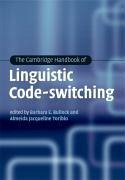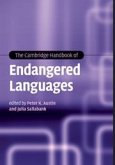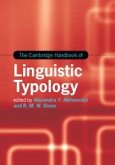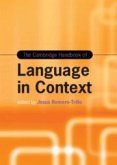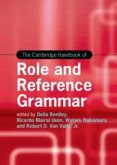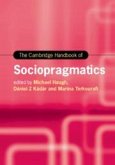The Cambridge Handbook of Linguistic Code-Switching
Herausgeber: Bullock, Barbara E; Toribio, Almeida Jacqueline
The Cambridge Handbook of Linguistic Code-Switching
Herausgeber: Bullock, Barbara E; Toribio, Almeida Jacqueline
- Gebundenes Buch
- Merkliste
- Auf die Merkliste
- Bewerten Bewerten
- Teilen
- Produkt teilen
- Produkterinnerung
- Produkterinnerung
This Handbook is a comprehensive and accessible overview of how bilinguals alternate between their languages when they speak.
Andere Kunden interessierten sich auch für
![The Cambridge Handbook of Endangered Languages The Cambridge Handbook of Endangered Languages]() The Cambridge Handbook of Endangered Languages208,99 €
The Cambridge Handbook of Endangered Languages208,99 €![The Cambridge Handbook of Linguistic Typology The Cambridge Handbook of Linguistic Typology]() The Cambridge Handbook of Linguistic Typology224,99 €
The Cambridge Handbook of Linguistic Typology224,99 €![The Cambridge Handbook of Language in Context The Cambridge Handbook of Language in Context]() The Cambridge Handbook of Language in Context204,99 €
The Cambridge Handbook of Language in Context204,99 €![The Cambridge Handbook of Role and Reference Grammar The Cambridge Handbook of Role and Reference Grammar]() The Cambridge Handbook of Role and Reference Grammar195,99 €
The Cambridge Handbook of Role and Reference Grammar195,99 €![The Cambridge Handbook of Heritage Languages and Linguistics The Cambridge Handbook of Heritage Languages and Linguistics]() The Cambridge Handbook of Heritage Languages and Linguistics205,99 €
The Cambridge Handbook of Heritage Languages and Linguistics205,99 €![The Cambridge Handbook of Historical Orthography The Cambridge Handbook of Historical Orthography]() The Cambridge Handbook of Historical Orthography230,99 €
The Cambridge Handbook of Historical Orthography230,99 €![The Cambridge Handbook of Sociopragmatics The Cambridge Handbook of Sociopragmatics]() The Cambridge Handbook of Sociopragmatics221,99 €
The Cambridge Handbook of Sociopragmatics221,99 €-
-
-
This Handbook is a comprehensive and accessible overview of how bilinguals alternate between their languages when they speak.
Hinweis: Dieser Artikel kann nur an eine deutsche Lieferadresse ausgeliefert werden.
Hinweis: Dieser Artikel kann nur an eine deutsche Lieferadresse ausgeliefert werden.
Produktdetails
- Produktdetails
- Verlag: Cambridge University Press
- Seitenzahl: 438
- Erscheinungstermin: 23. März 2009
- Englisch
- Abmessung: 253mm x 180mm x 53mm
- Gewicht: 1074g
- ISBN-13: 9780521875912
- ISBN-10: 0521875919
- Artikelnr.: 24927058
- Herstellerkennzeichnung
- Produktsicherheitsverantwortliche/r
- Europaallee 1
- 36244 Bad Hersfeld
- gpsr@libri.de
- Verlag: Cambridge University Press
- Seitenzahl: 438
- Erscheinungstermin: 23. März 2009
- Englisch
- Abmessung: 253mm x 180mm x 53mm
- Gewicht: 1074g
- ISBN-13: 9780521875912
- ISBN-10: 0521875919
- Artikelnr.: 24927058
- Herstellerkennzeichnung
- Produktsicherheitsverantwortliche/r
- Europaallee 1
- 36244 Bad Hersfeld
- gpsr@libri.de
1. Themes in the study of code
switching Barbara E. Bullock and Almeida Jacqueline Toribio; Part I. Conceptual and Methodological Considerations in Code
switching Research: 2. Research techniques for the study of code
switching Marianne Gullberg, Peter Indefrey and Pieter Muysken; 3. On the notions of congruence and convergence in code
switching Mark Sebba; 4. Code
switching and transfer: an exploration of similarities and differences Jeanine Treffers
Daller; 5. Loan translations versus code
switching Ad Backus and Margreet Dorleijn; Part II. Social Aspects of Code
switching: 6. Sociolinguistic factors in code
switching Penelope Gardner
Chloros; 7. The Conversation Analytic model of code
switching Joseph Gafaranga; 8. Code
switching and the internet Margreet Dorleijn and Jacomine Nortier; 9. Phonetic accommodation in children's code
switching Ghada Khattab; Part III. The Structural Implications of Code
switching: 10. Phonetic reflexes of code
switching Barbara E. Bullock; 11. Code
switching between typologically distinct languages Brian Hok
Shing Chan; 12. Language mixing in bilingual children: code
switching? Natascha Müller and Katja Francesca Cantone; 13. Code
switching between sign languages David Quinto
Pozos; Part IV. Psycholinguistics and Code
switching: 14. Code
switching and language disorders in bilingual children Adele W. Miccio, Carol Scheffner Hammer and Bárbara Rodríguez; 15. Code
switching, imperfect acquisition, and attrition Agnes Bolonyai; 16. Code
switching and the bilingual mental lexicon Longxing Wei; 17. Code
switching and the brain Marta Kutas, Eva Moreno and Nicole Wicha; Part V. Formal Models of Code
switching: 18. Generative approaches to code
switching Jeff MacSwan; 19. A universal model of code
switching and bilingual language processing and production Carol Myers
Scotton and Janice Jake.
switching Barbara E. Bullock and Almeida Jacqueline Toribio; Part I. Conceptual and Methodological Considerations in Code
switching Research: 2. Research techniques for the study of code
switching Marianne Gullberg, Peter Indefrey and Pieter Muysken; 3. On the notions of congruence and convergence in code
switching Mark Sebba; 4. Code
switching and transfer: an exploration of similarities and differences Jeanine Treffers
Daller; 5. Loan translations versus code
switching Ad Backus and Margreet Dorleijn; Part II. Social Aspects of Code
switching: 6. Sociolinguistic factors in code
switching Penelope Gardner
Chloros; 7. The Conversation Analytic model of code
switching Joseph Gafaranga; 8. Code
switching and the internet Margreet Dorleijn and Jacomine Nortier; 9. Phonetic accommodation in children's code
switching Ghada Khattab; Part III. The Structural Implications of Code
switching: 10. Phonetic reflexes of code
switching Barbara E. Bullock; 11. Code
switching between typologically distinct languages Brian Hok
Shing Chan; 12. Language mixing in bilingual children: code
switching? Natascha Müller and Katja Francesca Cantone; 13. Code
switching between sign languages David Quinto
Pozos; Part IV. Psycholinguistics and Code
switching: 14. Code
switching and language disorders in bilingual children Adele W. Miccio, Carol Scheffner Hammer and Bárbara Rodríguez; 15. Code
switching, imperfect acquisition, and attrition Agnes Bolonyai; 16. Code
switching and the bilingual mental lexicon Longxing Wei; 17. Code
switching and the brain Marta Kutas, Eva Moreno and Nicole Wicha; Part V. Formal Models of Code
switching: 18. Generative approaches to code
switching Jeff MacSwan; 19. A universal model of code
switching and bilingual language processing and production Carol Myers
Scotton and Janice Jake.
1. Themes in the study of code
switching Barbara E. Bullock and Almeida Jacqueline Toribio; Part I. Conceptual and Methodological Considerations in Code
switching Research: 2. Research techniques for the study of code
switching Marianne Gullberg, Peter Indefrey and Pieter Muysken; 3. On the notions of congruence and convergence in code
switching Mark Sebba; 4. Code
switching and transfer: an exploration of similarities and differences Jeanine Treffers
Daller; 5. Loan translations versus code
switching Ad Backus and Margreet Dorleijn; Part II. Social Aspects of Code
switching: 6. Sociolinguistic factors in code
switching Penelope Gardner
Chloros; 7. The Conversation Analytic model of code
switching Joseph Gafaranga; 8. Code
switching and the internet Margreet Dorleijn and Jacomine Nortier; 9. Phonetic accommodation in children's code
switching Ghada Khattab; Part III. The Structural Implications of Code
switching: 10. Phonetic reflexes of code
switching Barbara E. Bullock; 11. Code
switching between typologically distinct languages Brian Hok
Shing Chan; 12. Language mixing in bilingual children: code
switching? Natascha Müller and Katja Francesca Cantone; 13. Code
switching between sign languages David Quinto
Pozos; Part IV. Psycholinguistics and Code
switching: 14. Code
switching and language disorders in bilingual children Adele W. Miccio, Carol Scheffner Hammer and Bárbara Rodríguez; 15. Code
switching, imperfect acquisition, and attrition Agnes Bolonyai; 16. Code
switching and the bilingual mental lexicon Longxing Wei; 17. Code
switching and the brain Marta Kutas, Eva Moreno and Nicole Wicha; Part V. Formal Models of Code
switching: 18. Generative approaches to code
switching Jeff MacSwan; 19. A universal model of code
switching and bilingual language processing and production Carol Myers
Scotton and Janice Jake.
switching Barbara E. Bullock and Almeida Jacqueline Toribio; Part I. Conceptual and Methodological Considerations in Code
switching Research: 2. Research techniques for the study of code
switching Marianne Gullberg, Peter Indefrey and Pieter Muysken; 3. On the notions of congruence and convergence in code
switching Mark Sebba; 4. Code
switching and transfer: an exploration of similarities and differences Jeanine Treffers
Daller; 5. Loan translations versus code
switching Ad Backus and Margreet Dorleijn; Part II. Social Aspects of Code
switching: 6. Sociolinguistic factors in code
switching Penelope Gardner
Chloros; 7. The Conversation Analytic model of code
switching Joseph Gafaranga; 8. Code
switching and the internet Margreet Dorleijn and Jacomine Nortier; 9. Phonetic accommodation in children's code
switching Ghada Khattab; Part III. The Structural Implications of Code
switching: 10. Phonetic reflexes of code
switching Barbara E. Bullock; 11. Code
switching between typologically distinct languages Brian Hok
Shing Chan; 12. Language mixing in bilingual children: code
switching? Natascha Müller and Katja Francesca Cantone; 13. Code
switching between sign languages David Quinto
Pozos; Part IV. Psycholinguistics and Code
switching: 14. Code
switching and language disorders in bilingual children Adele W. Miccio, Carol Scheffner Hammer and Bárbara Rodríguez; 15. Code
switching, imperfect acquisition, and attrition Agnes Bolonyai; 16. Code
switching and the bilingual mental lexicon Longxing Wei; 17. Code
switching and the brain Marta Kutas, Eva Moreno and Nicole Wicha; Part V. Formal Models of Code
switching: 18. Generative approaches to code
switching Jeff MacSwan; 19. A universal model of code
switching and bilingual language processing and production Carol Myers
Scotton and Janice Jake.

